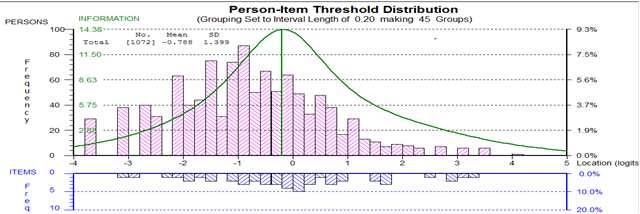Session Information
Session Type: ACR Poster Session A
Session Time: 9:00AM-11:00AM
Background/Purpose:
OMERACT Filter 2.0 encourages use of robust methods to develop new measures. Instrument results also should be highly relevant, easily scored and interpreted, and meaningful to stakeholders likely to use the instrument. We conducted Rasch analysis to further explore the psychometric properties OMERACT RA Flare Questionnaire (RA-FQ). We reviewed results with RA patients research partners (PRPs) to gain additional insight into the interpretability, meaningfulness, and utility of results.Methods:
People with RA in Canada (n=896), France (n=138), and the Netherlands (n=178) completed 5 items representing each of the OMERACT RA flare core domains. RUMM2030 was used to evaluate how the five items worked together, fit a unidimensional measurement continuum, and targeted the population of interest. We also evaluated reliability, response options, redundancy, local dependence, and response bias among groups (e.g., men vs. women, age categories, country/language). Ten PRPs first completed the questionnaire then reviewed individual and group findings to provide feedback.Results:
Rasch results supported use of the 5 items as a unidimensional measure of RA flare symptoms and impacts and the simply summation of items for a total score ranging from 0-50. Each item had ordered thresholds and acceptable fit. Reliability, was high (PSI =.91). Items and people covered a continuum ranging from -3.2 to +3.4 logits, and items were well-targeted to respondents. Overall model fit was excellent (χ2 = 31.6, df=45; p=0.935). There was little evidence of differential item functioning by sex, age, or country/language. Items suggest flare symptoms and impacts increased together showing a consistent story of how individuals experience worsening RA disease activity. Among PRPs, scores ranged from 10 to 41. There was unanimous agreement from the patients that the story depicted and individual results obtained were easily understood, meaningful, and very reflective of their current state. Many patients noted that beyond clinical trials, the RA-FQ could also enhance communication between doctors and patients at routine visits. Several noted potential applicability in monitoring day-to-day status and with self management.Conclusion:
The Rasch results offer additional support for the robust psychometric properties of the RA-FQ. Feedback from RA PRPs increases confidence in the relevance, meaningfulness, and easy interpretation of RA-FQ results for clinicians, researchers, and patients. |
Disclosure: S. J. Bartlett, None; S. Barbic, None; V. P. Bykerk, None; B. Fautrel, None; F. Guillemin, None; A. den Broeder, None; R. Alten, None; R. Christensen, None; E. H. Choy, None; D. E. Furst, None; S. Hewlett, None; A. L. Leong, None; L. March, None; T. G. Woodworth, None; C. Bingham III, None.
To cite this abstract in AMA style:
Bartlett SJ, Barbic S, Bykerk VP, Fautrel B, Guillemin F, den Broeder A, Alten R, Christensen R, Choy EH, Furst DE, Hewlett S, Leong AL, March L, Woodworth TG, Bingham C III. Coming Full Circle with the Omeract RA Flare Questionnaire (RA-FQ): Further Evaluation of the Properties, Meaningfulness, and Utility through Rasch Analysis and Feedback from RA Patients [abstract]. Arthritis Rheumatol. 2016; 68 (suppl 10). https://acrabstracts.org/abstract/coming-full-circle-with-the-omeract-ra-flare-questionnaire-ra-fq-further-evaluation-of-the-properties-meaningfulness-and-utility-through-rasch-analysis-and-feedback-from-ra-patients/. Accessed .« Back to 2016 ACR/ARHP Annual Meeting
ACR Meeting Abstracts - https://acrabstracts.org/abstract/coming-full-circle-with-the-omeract-ra-flare-questionnaire-ra-fq-further-evaluation-of-the-properties-meaningfulness-and-utility-through-rasch-analysis-and-feedback-from-ra-patients/
